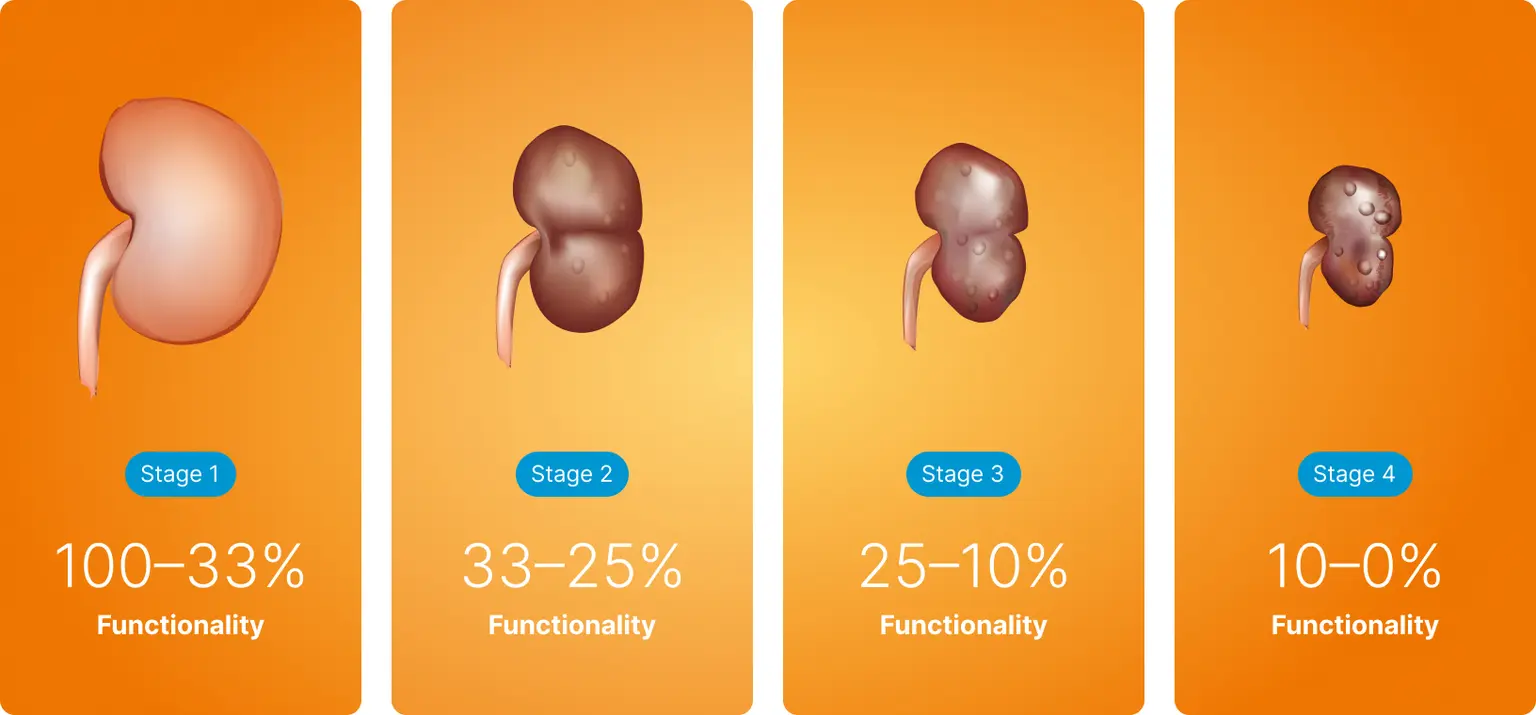
Chronic kidney disease
Your dog has been by your side for years - a true friend and companion. If it appears increasingly tired, its coat becomes duller, it eats less or even loses weight, these may be the first signs of ageing. But beware: this can also be the result of a disease such as chronic kidney disease (CKD). It mainly affects older animals and unfortunately the symptoms are usually not so obvious that you can always recognize them directly in your dog.
Chronic kidney disease (CKD) in dogs
CKD is a disease with a chronic course in which the dog's kidney function slowly continues to decline. Early diagnosis and a quick start to treatment are therefore essential. This is the only way to slow down the progression and maintain your pet's quality of life for as long as possible.
DEFINITION
What is CKD?
The kidneys perform numerous tasks in your dog's body. However, they can become a weak point, especially with increasing age: Chronic kidney disease is a common and serious disease in dogs. It is characterized by a progressive decline or even complete loss of kidney function.
Like you, your dog has two kidneys which fulfill numerous tasks as vital filter organs in the body. Each of these kidneys is made up of thousands of small filtering units (between 180,000 and 400,000) known as nephrons. Every day, all the blood in the body is pumped through the kidneys several hundred times, where it is purified and reprocessed with the help of the nephrons. The purified blood then flows back into the other organs. Excess water, toxins and waste products from the body's normal metabolism are first collected in the bladder via the renal pelvis and the ureters and finally excreted as urine via the urethra. In addition to this filtering function, the kidneys perform other important tasks such as regulating the water balance, acid-base balance, electrolyte balance and blood pressure. The kidneys also control the secretion of certain hormones.

In chronic kidney disease, the renal corpuscles, which are part of the nephrons, are damaged. The kidneys try to compensate for this loss by increasing the performance of the still-intact nephrons. Accordingly, their load increases and more nephrons die. This process continues to progress. As the kidneys are no longer able to perform their tasks adequately, chronic kidney disease (CKD) ultimately leads to progressive urinary intoxication (uremia). This is characterized by an increasing accumulation of toxins in the body.
In many cases, chronic kidney disease can be slowed down by early diagnosis and consistent treatment. This means that your dog can enjoy its everyday life even at an advanced age and you can still spend valuable time together.
SYMPTOMS
How can I recognize CKD?
If your dog shows the following signs, these could indicate chronic kidney disease:
- Nausea, vomiting
- Increased tiredness
- Reduced appetite
- Weight loss
- Increased drinking
- Increased or decreased urine output
- Diarrhea
- Pale mucous membranes
- Dull coat
- Bad breath, changes in gums
- Urge to urinate at night

Kidney check
Are you unsure whether your dog could be suffering from kidney disease? The following questions can help you to correctly assess your furry friend's symptoms and recognize a possible disease at an early stage.
CAUSES
What causes CKD?
It is often difficult to determine exactly why a dog suffers from CKD, as the onset of the disease usually goes unnoticed. However, events that have put a short-term strain on the kidneys are the main possible causes. Such stress can then develop into a chronic disease.
Common causes are:
- Inflammation of the kidneys
- Poisoning
- Disorders of the immune system
- Severe blood or fluid loss (e.g. severe diarrhea)
- Infectious diseases
- Blockage of the urinary tract due to urinary stones or other material
- Tumor diseases of the kidneys
- Genetic predisposition
DIAGNOSIS
How is CKD diagnosed?
If your dog is suspected to have chronic kidney disease, the veterinarian will first carry out a thorough examination. Additional tests such as blood and urine tests or an ultrasound examination of the kidneys can then be carried out to diagnose chronic kidney disease (CKD) with certainty or, in the best case, to rule it out.
CKD may be suspected if the creatinine and urea levels in the blood are elevated. These values only rise when kidney function is already impaired by around 75%, as the kidneys are no longer able to filter the waste products sufficiently. For this reason, so-called early markers (such as SDMA) are becoming increasingly important for the early detection of kidney disease. In addition, your dog's urine is examined to find out how well the kidneys are functioning and how severe the disease is. The blood, protein and sugar levels in the urine are checked for this.
Classification of CKD in dogs

To ensure that diagnoses are made uniformly, the International Renal Interest Society (IRIS) has defined standards. IRIS is an international group of renal specialists. They have defined different stages for chronic kidney disease (CKD) in dogs. These stages are based on how advanced the damage to the kidney tissue is. The veterinarian uses these stages to monitor the progression of the disease and select the appropriate treatment measures. There are a total of four stages in this scale.
The creatinine level in the blood is decisive for classifying kidney disease in dogs into one of the four stages. For a meaningful result, this must be tested repeatedly. As chronic kidney disease also leads to increased blood pressure in many dogs, your pet's blood pressure should be measured. Imaging procedures such as X-rays or ultrasound can also be helpful. They make it possible to detect changes in the structure, shape and position of the kidneys, such as calcifications, shrinking or enlargement of the kidneys and changes in the tissue.
TREATMENT
How can CKD be treated?
The earlier CKD is diagnosed and treated, the better the chances are of preserving your dog's kidney function for a long time and enabling it to continue to lead a good life.
This is also the aim of all therapeutic measures. If your dog is affected by CKD, its diet will first be changed to a special kidney diet to relieve the kidneys. You should also make sure that your dog drinks enough water, especially when it is very warm or if he has diarrhea or vomiting. Medication that can put strain on the kidneys should be avoided if possible. Your veterinarian will regularly check and monitor whether these measures are sufficient. If your dog shows other symptoms such as vomiting, gastritis or high blood pressure, these problems will also be treated.
And you can also do something for your dog's vitality and quality of life: Your veterinarian will certainly be happy to advise you on how to rebalance your four-legged friend's energy metabolism and support kidney function.
Heel Vet
If you want to support your dog, consider the natural veterinary medicines from Heel Vet.
PREVENTION
How can I prevent CKD?
Unfortunately, you cannot avoid chronic kidney disease through prevention. The most important recommendation is therefore: take advantage of the opportunities for early detection. One check-up per year is ideal - regardless of your dog's age. At the latest when your dog is fully grown, a blood test is also useful.¹ In dog breeds that are genetically predisposed to an increased risk of CKD, the kidney check should be started at a young age.
It is important to note that there are major differences in ageing between dog breeds. For example, large breeds such as the Great Dane are considered seniors from the age of 6, whereas this is only the case for smaller breeds from around 9 years of age.² You can check what stage of life your dog is in by using the Canine Life Stage Calculator (aaha.org), for example. There you can enter the breed and age of your dog and find out whether your dog is already considered a senior.
Check your dog's fluid intake
The kidneys can only fulfill their tasks if the animals take in enough water. Make sure that your dog has constant access to fresh water. This is particularly important in the event of diarrhea, vomiting or other situations in which your dog loses fluids.
Pay attention to the composition of the food
Some additives have to be excreted via the kidneys. Minerals promote the formation of crystals in the bladder if they accumulate in the urine. A balanced diet is therefore very important. It is best to discuss the correct diet with your veterinarian.
Avoid toxins
There are substances that are harmful to the kidneys, e.g. in antifreeze (ethylene glycol) and certain food (e.g. grapes/raisins). These should not be accessible to your dog. You should also keep medication out of "paw reach".
What else helps?
You know your pet best! Keeping a close eye on your dog, taking action when there are changes in behavior and attending regular check-ups at the veterinarian's practice are the best precautions you can take!


